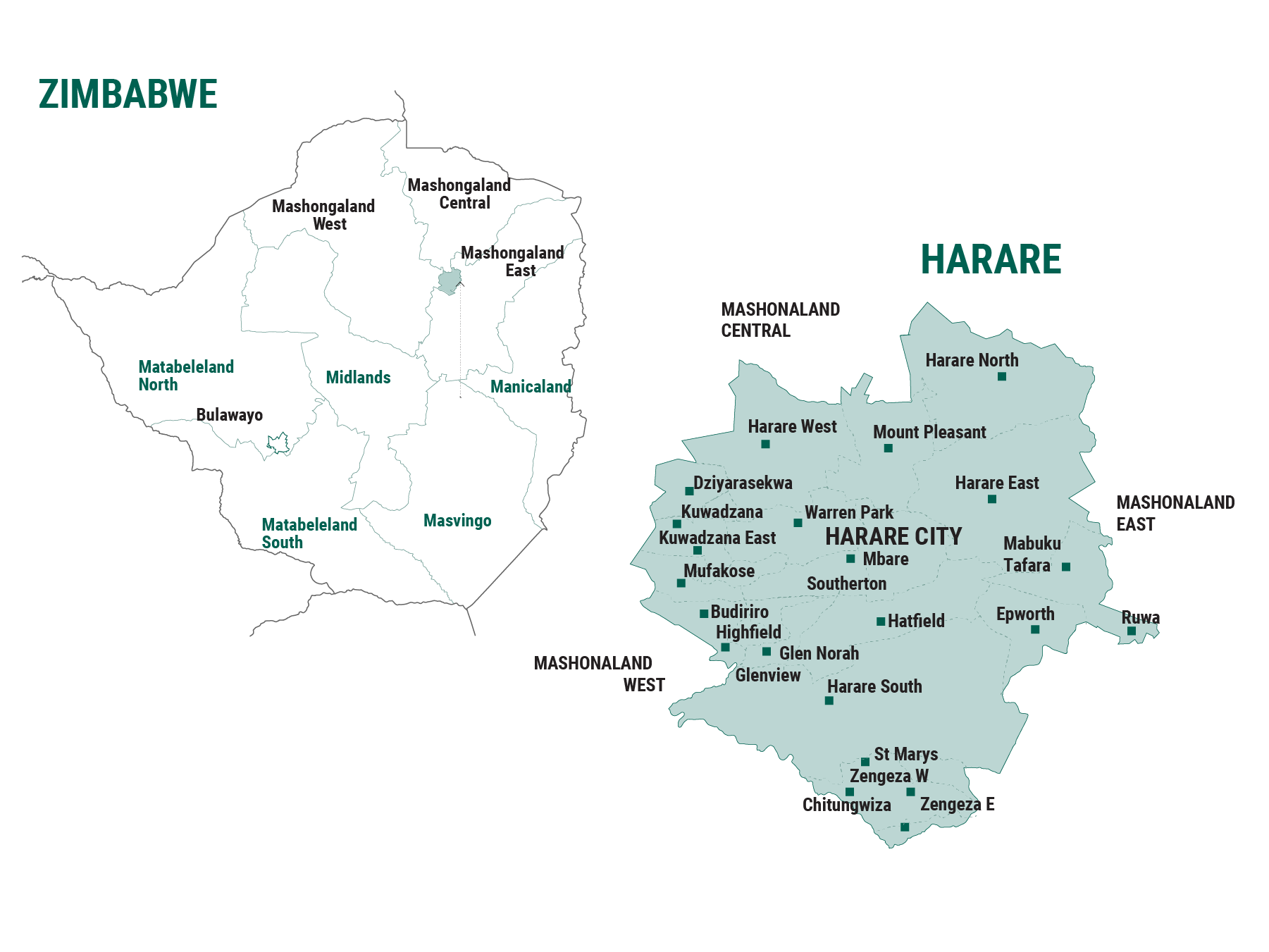Leadership
Jacob Mafume

Governance
Harare is the largest and most populated city in Zimbabwe, serving as the country's economic hub. It is situated within the Harare District and serves as the provincial capital of the Harare Metropolitan Province. In addition, Harare is the national capital, hosting essential administrative functions for the country. The city also provides services to surrounding towns, as well as peri-urban and rural communities located on its outskirts.
City of Harare

First voted as a councillor by the residents of his ward then voted as mayor by councillors of the City of Harare.

- Town Clerk's Office
- Department of Finance
- Harare Water
- Department of Works
- Department of Health Services
- Department of Housing and Community Services
Harare City website: https://www.hararecity.co.zw/departments (accessed November 2024)
- To provide potable water and wastewater management services
- To provide trafficable roads
- To provide an efficient and effective public transport system
- To provide an efficient and effective solid waste management system
- To provide decent and affordable accommodation
- To provide comprehensive and accessible health services
- To provide comprehensive and accessible social services
- To provide efficient public safety and emergency services
- To promote sound local governance
- To promote sound environmental management systems
- To provide coordinated and orderly spatial development
- To mobilise and ensure efficient utilisation of resources
Harare City. Harare Metropolitan Province website: https://harareprovince.co.zw/harare-city/
Harare is divided into 45 wards, each represented by an elected councillor. An additional 14 women councillors are appointed on a women quota proportional representation system to make them 59. A mayor and a deputy mayor are voted by councillors from among elected councillors.
The City of Harare is run using the Standing Committee system and councillors are seconded to different committees where they serve. Standing Committees enable a council to delegate decision-making to smaller groups of elected members where issues are investigated in more depth and in consultation with residents.
The City is made up of 9 Committees:
- Human Resources and General Purposes Committee
- Finance and Development Committee
- Environmental Management Committee
- Business Committee
- Small to Medium Enterprises Committee
- Educational Health, Housing and Community Services and Licencing Committee
- Audit Committee
- Information and Publicity Committee
- Sports and Arts Committee
City of Harare website: https://www.hararecity.co.zw/
Finances
USD 578,000,000
News report – The Herald, 2024: https://www.herald.co.zw/government-approves-harare-budget/
News report – The Sunday Mail, 2024: https://www.sundaymail.co.zw/new-women-commend-public-street-lighting-in-harare
Revenue sources include
- Levies
- Property taxes
- Service fees
- Municipal properties
- Rates
- Licenses
- Fines
- Transfers from the central govt./devolution funds
- Devolution funds from Central Government
City of Harare website: https://www.hararecity.co.zw/resources/download/280
Main economic sectors/activities include:
- Manufacturing
- Wholesale and retail
- Finance and insurance
- Information and communication
- Transport
- Informal economy
Zimbabwe National Statistical Agency 2019: https://www.zimstat.co.zw/wp-content/uploads/publications/Income/NationalAccounts/Final_Provincial_GDP_Report2019_2020.pdf
Development Profile
Population Trends
Population Trends
Harare-Age-Pyramid
Age Pyramid

2,784 / km2
Population Trends
1,849,617
Population Trends
872 km2
Population Trends
1,598,830
Population Trends
2,868,667
Population Trends
Unemployment
Unemployment
Informal Economy
Informal Economy
29.30%
Unemployment
88.30%
Informal Economy
Education: Literacy Rate
Literacy Rate
HDI Score
Human Development Index Score
Human Development Index Definition
The HDI score, ranging from 1 (best score) to 0 (worst score), summarises the average achievement across three basic dimensions of human development:
• A long and healthy life (life expectancy at birth)
• Knowledge (mean years of schooling for adults 25 years and older; expected years of schooling for children of school entering age)
• A decent standard of living
Education: Facilities
Facilities
35
Education: Facilities
0.55
HDI Score
98%
Education: Literacy Rate
Education: Facilities
20
Education: Facilities





.jpeg)























